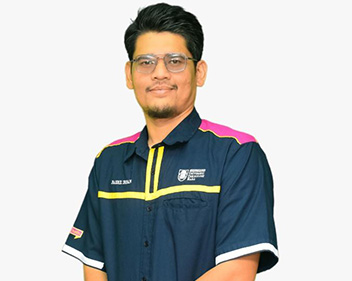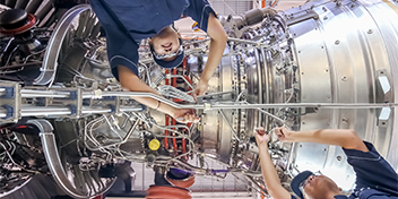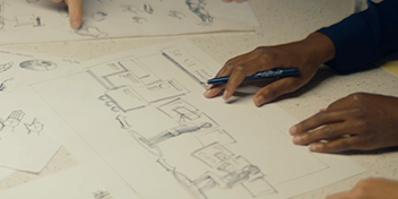What inspired you to become an engineer or pointed you towards an engineering career?
Ever since high school, I have known that I am left-brain dominant. I have always been fascinated by formulas and numbers, more than art and drawing. Subjects like physics, technology and engineering have always caught my attention in class. My interest in engineering rapidly grew due to the wonder of how oil and gas are extracted from the subsurface, and how giant oil and gas platforms can be installed in remote offshore areas. This inspired me to pursue a degree in mechanical engineering.
Please describe your role or position within your workplace.
I work as a Senior Lecturer in the Oil and Gas Department at the College of Engineering, Universiti Teknologi MARA (UiTM). My job involves planning, developing, and delivering engineering lessons, as well as providing consultancy services through professional advice. In addition to teaching and learning, I have the freedom to conduct research in areas such as reliability and maintenance, safety and risk, and asset integrity. I also supervise postgraduate students and publish my research in journals and conferences. Prior to joining UiTM, I worked for more than five years in maintenance, reliability, and safety fields with various oil and gas companies. I was involved in various project design phases, including conceptual design (CD), front end engineering design (FEED), and detailed design (DD). My experience covers execution of reliability, availability and maintainability (RAM) study, safety critical element management and establishment of performance standard (SCE-PS), acoustic induced vibration (AIV) analysis, and maintenance manual development.
Can you describe a typical working day?
My work as an academic varies every day. My main responsibilities include preparing and delivering lectures, tutorials, and seminars for students in the fields of oil and gas facilities engineering, as well as maintenance and reliability engineering. Additionally, I supervise the work of final year students, participate in course-setting committees, curriculum revision and academic planning. To expand my technical knowledge, I engage in consultancy work by providing technical evaluations and solutions to the industry such as control of industrial major accident hazards evaluation reports to ensure compliance with relevant authorities' requirements. At present, I am working towards my doctorate in the field of Prognostics and Health Management at Cranfield University in the United Kingdom.
Are there any particular challenges or unusual aspects to your role?
Teaching and learning in the 21st century present unique challenges. High student satisfaction is critical, and to achieve it, innovative teaching and learning techniques are needed. Therefore, universities need to adopt new technologies and approaches in teaching and learning to improve the quality of education and equip students with skills relevant to the future job market. This includes the introduction of new technologies, teaching methods and approaches that meet the changing needs of students and society.
What do you find most enjoyable about your job?
The freedom to conduct research in areas of interest as well as developing future engineers and achieving high student satisfaction is the most rewarding part of my career.
Is there a great professional achievement or high-profile accomplishment that you would like to tell us about?
I hold several professional registrations and have received recognition for my work in the field of reliability, maintenance, and risk. I am a registered Chartered Engineer (CEng), Professional Engineer with the Board of Engineers Malaysia (BEM), Association of South East Asian Nations (ASEAN) Chartered Professional Engineer (ACPE) registered with the ASEAN Chartered Professional Engineer Coordinating Committee (ACPECC), and a Professional Technologist (Oil and Gas Technology) registered with the Malaysia Board of Technologists (MBOT). Additionally, I have successfully secured various industrial and government grants.
What contributed to your decision to become professionally registered?
Professional recognition is mainly about self-satisfaction and demonstrating required competence, commitment, and continuous professional development (CPD).
In what ways has registration benefitted your career?
Registration has benefited my career in numerous ways. I now have access to expert talks, events, career opportunities, and training workshops. Additionally, I have library access to books, articles, codes, and standards that help me strengthen and improve my knowledge. This keeps me up to date with the latest news in relevant subject areas. The connections between professional networks, both locally and internationally, provide opportunities for collaboration - which is the most important benefit to highlight. All these benefits help me expand my knowledge, open my mind, and anticipate the latest developments in my field of interest.
How does your employer benefit from your professional registration?
As an academic, it is mandatory to be professionally registered to ensure that you are not only knowledgeable about theories but also demonstrate the necessary competence, commitment and continuous professional development (CPD). Each registration title, according to the UK Standard for Professional Engineering Competence and Commitment (UK-SPEC), must demonstrate competence and commitment in five key areas, namely: knowledge and understanding, design, development and solving engineering problems, responsibility, management and leadership, communication and interpersonal skills, and professional commitment. In addition, all engineering courses in Malaysia require a minimum number of members of the professional register to ensure that the courses are accredited by the BEM, the regulatory body that oversees engineering education and professional engineering practise in the country.
Is there any advice you would pass on to someone considering professional registration?
Go for it, because professional registration is mainly about self-satisfaction and the evidence that you have demonstrated the required competence and commitment, as well as CPD. Once registered you will have access to materials and opportunities that will strengthen and improve your knowledge and keep up to date with the latest news in relevant subject areas. Not to forget the connections between professional networks locally and internationally and the opportunities for collaboration - the key benefits to highlight.
Where do you see yourself in your career in five years’ time or what are your future ambitions?
Now that I am pursuing my PhD, my goal is to obtain my doctorate within three years. After completing this course, I plan to establish a research group on reliability, maintenance, and digital engineering at my current university. This group will focus on conducting research on industrial maintenance, particularly on Maintenance 4.0 and 5.0, in collaboration with industry partners to address industrial problems. Additionally, I aim to improve networking between the university and industry, gain more knowledge on integrating technology in teaching, expand my research experience, advance to a higher position in the faculty, and enhance my research networking capabilities.
Outside work, is there any activity you enjoy doing in your spare time that relates to engineering? For example, do you participate in mentoring, volunteering or membership of other engineering groups?
I mentor young and future engineers, especially my students working in various industries, towards gaining professional registration and encourage and guide colleagues towards registration.









